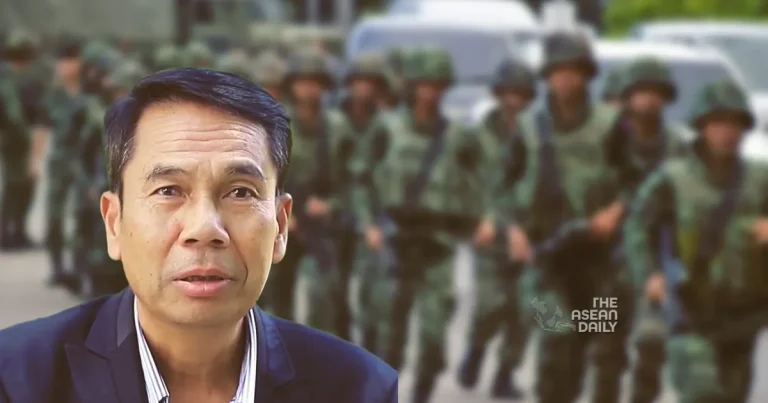10-9-2023 (BANGKOK) All eyes are on the newly appointed Defence Minister of Thailand, Sutin Klungsang, as he takes on the task of working collaboratively with the military to ensure stability for the Pheu Thai-led coalition government.
Sutin, a civilian overseeing military affairs, will have to navigate various challenges that lie ahead, including military reform, addressing the unrest in the southern region, and managing military relations with neighboring countries.
Notably, Sutin is the first civilian to hold the position of Defence Minister without concurrently serving as the prime minister. Previous defence ministers who were civilians also held the position of prime minister, such as MR Seni Pramoj, Chuan Leekpai, Samak Sundaravej, Somchai Wongsawat, and Yingluck Shinawatra.
Observers have noted that Thaksin Shinawatra, the former prime minister currently in jail and widely believed to be the de facto leader of the Pheu Thai party, aims to prevent any future coups by ensuring that the military does not pose a threat to the Pheu Thai-led government.
Thaksin’s administration was overthrown in a coup on September 19, 2006, while Yingluck, his younger sister, faced a similar fate when a military putsch took place on May 22, 2014. These experiences have led to Thaksin’s lack of trust in the military even after the formation of the current Pheu Thai-led government.
To reduce the influence of what is referred to as the “three brothers in arms,” which includes former prime minister Prayut Chan-o-cha, Palang Pracharath Party (PPRP) leader and former deputy prime minister Prawit Wongsuwon, and former interior minister Anupong Paojinda, Thaksin has been keen on promoting civilian oversight within the new government.
Although the PPRP and the United Thai Nation (UTN) Party are now coalition allies with Pheu Thai, Gen Prawit did not receive a cabinet post, and Gen Prayut resigned as a UTN member and quit politics.
Initially, Gen Vit Thephasdin Na Ayutthaya, a former chief strategist of the PPRP and close aide to Gen Prawit, and Gen Natthapon Nakpanich, former secretary-general of the National Security Council and close to Gen Prayut, were tipped to become the defence minister. However, Sutin, a Pheu Thai MP for Maha Sarakham, was ultimately selected over them.
According to sources, Thaksin instructed Pheu Thai to choose Sutin to demonstrate that a civilian can effectively run the Defence Ministry. As a compromise, Gen Natthapon is expected to serve as the Defence Minister’s secretary-general.
Furthermore, Deputy Prime Minister Phumtham Wechayachai, another civilian, is likely to be entrusted with the responsibility of national security. Phumtham, who also serves as the Commerce Minister, is a close associate of Thaksin.
The new government’s efforts to restore peace in the southern region have garnered attention. Additionally, the appointment of a replacement for Gen Wanlop Rugsanoh, who headed the government’s negotiation efforts, is eagerly anticipated. Gen Wanlop, appointed by former prime minister Gen Prayut, had to step down when the previous government left office.
Prime Minister Srettha Thavisin reportedly prefers a civilian to handle the peace process, although finding capable and experienced individuals for such a specialized role is challenging.
The armed forces, on the other hand, advocate for a former senior military officer with regional experience to take over the position. If a civilian is ultimately chosen, it would confirm the government’s intention to diminish the military’s role and influence, according to sources.
Dr. Prommin Lertsuridej, secretary-general of the prime minister, stated that the appointment of a civilian as defence minister is in line with international practices and does not have any hidden agenda to prevent future coups.
It remains to be seen whether the government will attempt to amend the Ministry of Defence Organisation Act BE 2551 (2008) to eliminate the committee responsible for appointing military generals. This move would pave the way for the defence minister to assume the responsibility of appointing armed forces leaders. Currently, Sutin, as the Defence Minister, has no deputies and only one vote compared to the committee’s five votes.
The fate of the Internal Security Operations Command (Isoc) is also uncertain. Thaksin disbanded Isoc when he served as prime minister, but it was revived after the 2006 coup. Sutin has left the decision on disbanding Isoc to the prime minister, who currently holds the position of Isoc’s director.
The new defence minister, Sutin Klungsang, faces numerous challenges in his role. Panitan Wattanayagorn, a security expert, believes that a defence minister who does nothave a military background can bring fresh perspectives to the position. However, it also poses challenges in terms of establishing credibility and effectively managing military affairs.
One of the key challenges for Sutin will be military reform. Thailand’s military has traditionally held significant power and influence in the country’s politics. Implementing reforms to increase civilian oversight and reduce the military’s role will require careful navigation and balancing of interests.
Addressing the unrest in the southern region of Thailand will also be a priority. The region has experienced long-standing separatist movements and ongoing violence. Sutin will need to work towards finding a peaceful resolution and addressing the underlying grievances of the local population.
Managing military relations with neighboring countries is another critical aspect of the defence minister’s role. Thailand shares borders with several countries, including Cambodia, Laos, Malaysia, and Myanmar. Sutin will need to maintain diplomatic relations, navigate border disputes, and ensure regional stability.
The appointment of a civilian defence minister is seen as a move to prevent future coups and increase civilian control over the military. Thaksin Shinawatra, the de facto leader of the Pheu Thai party, has been pushing for civilian oversight to safeguard the government from military interference. However, this also raises concerns about potential resistance and pushback from the military establishment.




